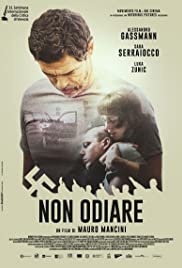
NON ODIARE/THOU SHALT NOT HATE
Italy, 2020, 95 minutes, Colour.
Alessandro Gassman, Sara Serraiocci, Luka Zunic, Lorenzo Buonora, Lorenzo Acquaviva.
Directed by Mauro Mancini.
The title is phrase like one of the 10 Commandments. This is a contemporary drama about Jews in Italy, descendants of Holocaust victims, the rise of neo-Nazis. It is set in the city of Trieste a.
We are introduced to a surgeon, a man of some integrity, played by Alessandro Gassman. He carries a family burden that his father did dental work for the captors in the concentration camp.
The drama begins when he goes to the rescue of man who has crashed his car. He then discovers neo-Nazi symbols. The car victim was one of the leaders of the local fascists. While the surgeon had acted as a Good Samaritan, the consequences are, at times, quite dire for him.
He becomes the target of a group of neo-Nazis, especially the son of the crash victim. But, he also encounters the young man’s sister who has somewhat different views. He is attacked, but is asked to be the Good Samaritan again, when his young attacker is wounded and he is faced with the human decision about helping him.
The film takes a somewhat more optimistic tone than might have been anticipated, the possible rehabilitation of the young attacker. But, the surgeon, despite entanglements with the family, retains his integrity.
1. The title? A commandment? In the context of World War II, the Holocaust, memories, fascist traditions, neo-Nazis?
2. The Italian setting, the city of Trieste? The streets, the homes, the views? The surrounding countryside? River, kayaking? The musical score?
3. Simone’s story, the presence of Alessandro Gassman, age, doctor, seen in surgery, his skills? The family background, alienation from his father, his father’s war experiences, the camps, dental work for the captors and Simone’s reaction? His father leaving? Simone’s apartment, lavish? His father’s house, the furniture, junk, shambles? Simone intending to sell, the removal of the furniture? The visit with Marica?
4. The opening, the peace of the kayaking, the cars, the crash, Simone going to the rescue, and Antonio, his injuries, Simone helping, discovering the neo-Nazi symbols, SS, swastika? Unbinding his leg, letting the man die? His attitude, the aftermath, conscience? The news about the dead man, art, jobs, his family?
5. The neo-Nazis, the audience seeing the funeral, the skinheads, the salute?
6. Simone, seeing Marica, putting up the notices, following her, his paying off his cleaner, inviting Marica, the tour of the house, cleaning twice a week, the payment, the diligence, cleaning? The attraction?
7. Marica at home, the interactions with Marcello? Paolo and his age, coaching him? Marcello and his anger, anti-Semitic, violent reaction? He and his thugs attacking Simone in the street? Marica not worrying about the Jewish background? Paolo and his visit, his frank questions about being Jewish, Simone taking him to the park to play?
8. Simone, following Marica, going to the supermarket, the later questioning him? The continued attraction? Marica and her detachment, explaining her past, accountancy, the sense of debt to the family? Looking at the planes and wondering about their destinations?
9. Marcello, the meeting with Rocco, friend with his father, yet the debt, the huge amount, the time limit? Rocco trying to find the money, Marica pawning jewellery, prepared to sell the car? Marcello approaching Rocco, the discussion, Rocco relentless, Marcello stabbing him, Rocco shooting him, Rocco’s death? Marica bringing Marcello to the house, Simone and his decision to help Marcello? Marcello reacting to having Jewish blood? The transfusions, the bullet, Marcello and his recovery? In the house, the meal?
10. Simone and the relationship, Marcello looking out the window? A future?
11. Marcello, hair growing again, working in the garage? Simone and the kayaking? What future?
12. The Jewish issues woven into the characters and the narrative rather than declarations and speeches?